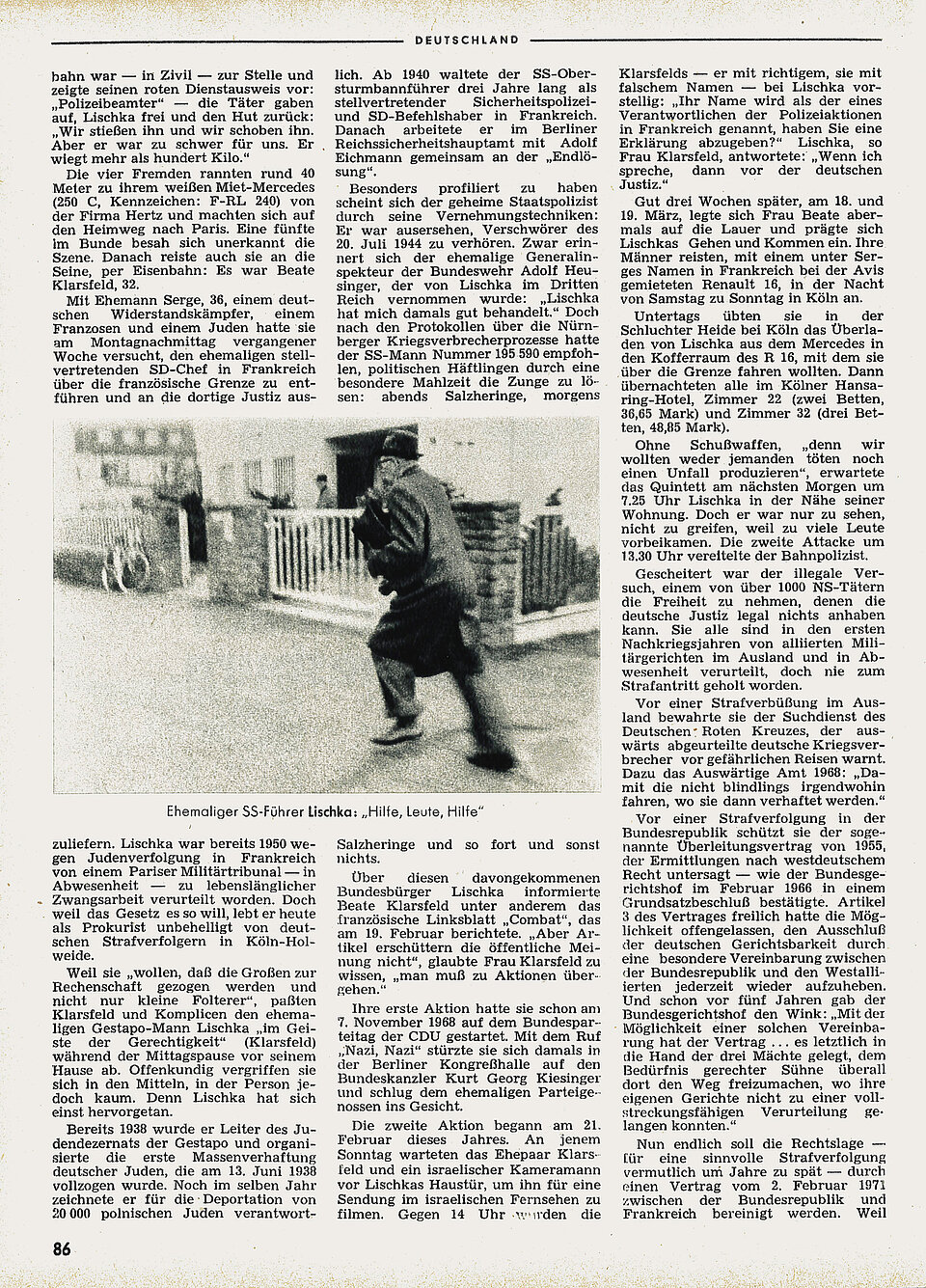Legal Proceedings and Political Processing
After the war, the allies wanted the perpetrators to be tried.
The French government introduced charges of “crimes against humanity” against the main war criminals being tried in Nuremberg. However, most perpetrators were able to integrate themselves back into German and French society with relatively little difficulty a few years after the prosecution.
The Eichmann Trial in Jerusalem (1961), the first Auschwitz Trial in Frankfurt am Main (1963-65), and the Barbie Trial in Lyon (1987) were turning points in the understanding of crime and slowly brought about a change in thinking. The criminal prosecutions continue to this day.

As late as March 1945, the mayor of Kandel (Palatinate) declared he had decided to have the last of the community’s Jews murdered. In 1947, the chief prosecutor of the case could not see any criminal offence in this threat.

Although the Head of the Gestapo in Lyon, Klaus Barbie, was sentenced in absentia to death in France 1947, for the first few years after the war he worked for numerous Western secret services. In 1951, under the name Klaus Altmann, he and his family to Bolivia. However, the investigation by the German embassy in 1966 only revealed that Altmann was a “member of the SS with high officer rank […] in France”. Only in 1983 did Bolivia hand Barbie over to France. In the ensuing trial, Léa Feldblum, the only survivor from the Izieu children’s home, was an important witness for the prosecution. Barbie was sentenced to life in prison and died in incarceration in 1991.

In 1948, the public prosecution department began investigating the former head of the SS security service in Villingen, due to his participation in the deportations to Gurs. The charges against Hans Helbing were pursued without particular vigour by the prosecution and they were soon dropped due to the fact that the interrogated police officers were either unable or unwilling to provide any concrete evidence. In 1949, Helbing was sentenced to three years in prison for his work at the SS security service during the denazification trials, but he was pardoned after only serving one year of his sentence.
“When, in France, I heard of the transports of Jews from Baden and the Palatinate to France, one initially had the feeling that these Jews might have a milder fate than if they were in Germany. Then came the first reports of abuses and suffering of these Jews held in the camps in the Pyrenees. When we then heard of the transports in the East, they initially said that they would perhaps be better off there than in the Pyrenees, because if they were being deployed as workers then one must at least treat them with some decency.”
Charges were brought against Ernst von Weitsäcker at Nurnberg. The former undersecretary of the Foreign Office had been involved in his ministry’s preparatory work for the Wannsee Conference. In his court statement in 1948, he attempted to deny his responsibility for the crimes. The conditions at Gurs were a part of his defence strategy. The Stuttgart-born minister was initially sentenced to seven years in prison but was pardoned in 1950.

As general secretary of the prefecture of Gironde, Maurice Papon was co-responsible for the arrests and deportations in 1942. After the war, he became a prefect of the Paris police and later the budget minister. It was only at the end of his career that charges were pressed. The subsequent trial ended in a conviction in 1998. Due to poor health, Papon only spent three years behind bars. He died in 2007.

On the 16th of July 1995, French president Jacques Chirac broke from the official position of his predecessors. During a memorial event for the Vél’ d’hiv’ raids, he recognised France’s co-responsibility for the deportations of Jews: “France, home of the enlightenment and human rights, did something on this day that can never be made right. France broke its word and delivered the people in its care to the executioner.”

In the main cemetery in Neustadt, on Wein street, is the grave of the former Gauleiter of the Saar-Palatinate district, Josef Bürckel. In the more recent past, there were numerous heated discussions on how this monument should be dealt with. In 2017, the regional advisory council for the care of memorials in Rhineland-Palatinate recommended there be a contextualisation at the site of the grave. The question remains: How should we deal with the graves of perpetrators today?



